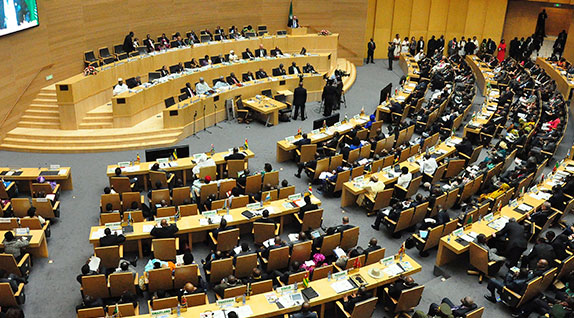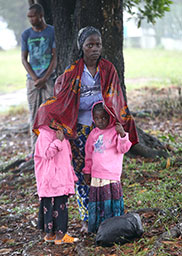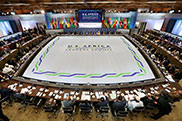 Samuel Gebru/AFP/Getty Images
Samuel Gebru/AFP/Getty Images
Article
Africa has long attempted to come together, but with little success. Here is why.
Learn the why behind the headlines.
Subscribe to the Real Truth for FREE news and analysis.
Subscribe NowThere is a tendency to see the entire continent of Africa—which is made up of 54 separate nations and encompasses nearly 20 percent of Earth’s total land—as one gigantic country.
The approach of merging the continent’s unique landscapes, divergent cultures, and peoples who speak over 1,000 languages makes it difficult to fully appreciate its variety. Yet some are trying hard to change this view.
One of the more creative ways is through a computer application two major newspapers are using to track how many times they print “Africa” in lieu of naming a particular African nation in stories. The thinking is that measuring this will help hold journalists accountable and ultimately lead to change.
Alongside this struggle for uniqueness, however, are aspirations of solidarity. Africans want to be seen as one—a U.S.A., or “United States of Africa” as it has been called. Their goal is not to do away with individuality among nations, but instead to help others view the continent as a single prominent player on the world stage—a superpower bursting with potential.
 Mohamed Abdiwahab/AFP/Getty Images
Mohamed Abdiwahab/AFP/Getty Images Proponents of unity proclaim the continent is an untapped economic powerhouse. They propose that its one-billion-plus occupants—second most on the planet—provide a vast marketplace for products and services. Africa’s populace, they maintain, also boasts a large potential workforce and hosts the youngest population among continents—all eager and ready to contribute.
Further investment possibilities exist with the development of infrastructure for telecommunications, electricity and delivering potable water.
Human capital is not Africa’s only asset. It is also a world leader in mining rare minerals critical for industry. It provides 80 percent of the world’s platinum (for the automobile and jewelry industries), 49 percent of its palladium (for electronics manufacturing), 55 percent of its chromium (for stainless steel production), and is becoming a global resource for oil and gas.
Militarily, Africa has 22—just over 20 percent—of the world’s top 106 nations listed on the Global Firepower rankings website. This ranking is based on a nation’s “conventional war-making capabilities across land, sea and air.”
Such a high proportion of representation speaks to the continent’s fighting prowess.
A large population, vast resources, and an adequate military usually makes for a respected global entity. Yet despite having all three, Africa continues to be dismissed—largely unable to shed its perception as a group of divided, “third world” countries.
Unlike the European Union, Africa has been unable to come together as a community of nations and present itself to the world as a viable entity.
What is holding the continent back?
Significant Roadblocks
Any conversation about Africa’s ability to integrate could start with acknowledging its numerous problems. It has long been vexed by disease, poverty, hunger, war and instability—all of which seem insurmountable.
 John Moore/Getty Images
John Moore/Getty ImagesThe Ebola virus, which has reemerged in West Africa, illustrates the trials the continent faces, especially regarding health. Originally discovered in the 1970s, the virus kills up to 90 percent of those infected and is back on the scene wreaking havoc.
World Health Organization Director-General Dr. Margaret Chan summed up the impact in an August 2014 speech, “…this [Ebola] outbreak is moving faster than our efforts to control it. If the situation continues to deteriorate, the consequences can be catastrophic in terms of lost lives but also severe socioeconomic disruption and a high risk of spread to other countries.”
Sadly, Ebola is just one of several deadly diseases troubling the continent. Despite having only about 15 percent of the world’s population, Africa accounts for 70 percent of all AIDS cases and over 70 percent of all AIDS deaths worldwide. Even older diseases, such as malaria, which most parts of the world have successfully overcome, still afflict the area. The United States Centers for Disease Control and Prevention reported that 91 percent of worldwide deaths from the parasite occurred in the African region in 2010.
 John Moore/Getty Images
John Moore/Getty ImagesWhile parts of Africa are growing economically, the continent still contains a majority of the world’s poorest nations. In Sub-Saharan Africa, nearly 50 percent of the people lived on $1.25 or less a day in 2010.
“The number of poor…almost doubled, from 200 million in 1981 to about 380 million in 2005. If the trend persists, a third of the world’s poor will live in Africa by 2015,” The World Bank stated.
Africans are also experiencing famine. In the Sub-Saharan region, one in every four people battle hunger. It is also the cause of one in every three childhood deaths (The Hunger Project).
In addition, conflict ravages the continent. Civil wars and clashes have led to over 9 million deaths since the end of the Cold War and another 9 million refugees and internal displacements, according to Virgil Hawkins, author of the book Stealth Conflicts – How the World’s Worst Violence Is Ignored. On top of this, since 1981, no fewer than 28 nations in Sub-Saharan Africa have been at war.
Tackling these problems leaves Africans with little strength to unite. Yet do these roadblocks actually prevent union or are they the result of disunion?
International Cooperation
“Give a man a fish and you feed him for a day; teach a man to fish and you feed him for a lifetime.” This saying is at the heart of philosophical and ethical discussions about how nations of the world cooperate and interact with those in Africa.
The United Nations, World Bank, and the International Monetary Fund, to name a few, have poured billions of dollars into projects and infrastructure with the goal of improving the continent’s standard of living. The thinking is that “aid today leads to growth tomorrow.”
The results have been mixed at best. Many believe large parts of Africa have been “given a fish” for too long, which has hindered their ability to unify and rise from obscurity.
“Financial aid going to African countries has often been mostly emergency food aid needed as short-term help with famines, and any longer-term aid has often been misappropriated for personal wealth by corrupt officials or for military spending. Where useful financial aid has been supplied to African countries it has often been in the form of loans with high interest rates that poor countries find too expensive a debt burden. Africa has to date attracted little foreign investment though much of that has been more stable longer-term European investment as in mining,” world-poverty.org stated.
In many cases, Africans are dealing with fledgling governmental structures due to the exit of colonial powers. Most, however, are worse off financially than they were after initially attaining independence in the mid-20th century.
Foreign interaction with the nations of Africa is not limited to providing and receiving aid, however. There is also much outside involvement along the lines of normal international relations.
Africa continues to establish trade and commercial affiliations with several nations worldwide, including the United States.
 Chip Somodevilla/Getty Images
Chip Somodevilla/Getty ImagesIn August 2014, U.S. President Barack Obama invited 50 African leaders to the White House for a U.S.-Africa Leaders Summit. An important goal of the conference was to focus on trade, investment and “fostering stronger ties between the United States and Africa.”
The president remarked during a speech in which he announced several business initiatives with American companies: “…I don’t want to just sustain this momentum, I want to up it. I want to up our game…I’m announcing a series of steps to take our trade with Africa to the next level.”
Many see this first-of-its-kind meeting as a reaction to the inroads others, including China, have made on the continent.
China’s own history with colonialism helps them relate to many African nations, and the abundance of cash available for the Asian giant to invest has further strengthened ties with Africa. According to China Daily, Chinese investments in the continent rose from $10 billion in 2000 to $200 billion in 2013.
“The concept of ‘West is best’ is now a thing of the past,” Der Spiegel reported. “Disappointed by Europe and America, where their continent has often been written off as a hopeless case, Africans have instead looked to the Far East. There, they have found a strong ally, one that is mainly interested in doing business and doesn’t interfere in their internal affairs. China attaches no political conditions to economic cooperation, unlike the West, which, at least on paper, demands good governance, the rule of law, anti-corruption measures and protections for human rights.”
Yet the quid-pro-quo relationship between China and Africa is not without its critics—even within the continent itself. There are concerns that focusing just on business, without accountability, will not best serve the African people in the long run.
Another Der Spiegel article noted that this non-interference approach is no panacea and “one of the reasons that despots…hold the Chinese in such high regard. Cooperating with China fills their empty coffers and enables them to secure their hold on power. And Africa’s dictators are not badgered when they oppress and prey on their own people.”
Whether it is through direct aid or normal international business relations, involvement from the outside has fallen short of helping Africa come together. The continent’s only hope, therefore, may be to help itself from within.
United States of Africa
Over 50 years ago, individual African states began a legitimate quest for unity by forming the Organization of African Unity (OAU). By 2002, this group had grown and was renamed the African Union (AU). All but one African country currently has membership in the union. Like its counterpart in Europe, the AU desires to address the world as one unified body.
The AU governmental structure is similar to the European Union. Its Assembly of the African Union is made up of heads of state and governments of member states. It is the supreme governing body for the union and is charged with making the group’s most important decisions.
Other governing bodies include the Pan-African Parliament, the union’s highest legislative body; the African Court of Justice, its highest court; and the Executive Council, which deals with matters of foreign trade, food, agriculture and communications. There are even efforts to establish a central bank for the continent and one currency that will be known as the “afro” (similar to the euro). Again, Africans want to duplicate the perceived success of the EU.
A few of the AU’s objectives as stated on its website are: (1) to achieve greater unity and solidarity between African countries and Africans; (2) to promote peace, security, and stability on the continent; (3) to promote sustainable development at the economic, social and cultural levels as well as the integration of African economies; (4) to promote cooperation in all fields of human activity to raise the living standards of African peoples; and (5) to work with relevant international partners in the eradication of preventable diseases and the promotion of good health on the continent.
These represent only a third of their goals. But think: achieving just these five would have an enormous impact on the continent. So why after nearly half a century has such little progress been made?
The answer is simple. Unity in principle is much different than unity in execution. Almost from the very beginning, the idea was doomed to fail.
As an article from RFI titled “The Broken Dream of African Unity” put it, “…even during its formation, the OAU was mired in disagreements over its future objectives and prerogatives.”
The book detailed OAU disagreements about Africa’s emergence from colonialism—whether it should have been an “Africa of nations” or as a “federalist” entity similar to the United States—as well how each leader had differing opinions about how Africans should combine nations of varying degrees of economic strength. Eventually, the OAU became more divided and any real progress was obstructed.
The switch to the African Union in the 2000s became a sort of “reset” on the OAU’s efforts. Still, challenges have persisted.
As more and more issues continue affecting the continent, including conflicts in Darfur, Somalia and Zimbabwe, rampant corruption among certain leaders, and the inability of the nations to agree on how to combine multiple forms of government, a “United States of Africa” has become regarded as an idea that World Politics Review called “woefully ahead of its time.”
What Is Lacking
A common thread with all the approaches to African unification is a lack of consistent direction. Competing interests, whether internal or external, are the demise of what may be well-meaning attempts to address issues.
Usually, a lack of direction is a telltale sign of a dearth of leadership.
This lack of strong leadership is a continuing theme for many African countries. Corruption, instability and violence have hindered progress in multiple nations of the continent. Often, misguided leaders have filled the void left by European colonists and brutal civil wars. Some have bucked this trend, yet they alone have never been able to turn the tide toward continental unity.
This lack of proper leadership is the main reason Africans have found it so difficult, actually impossible, to unite.
The Bible—considered by many, even among secular sources, to be a most effective book on leadership—has much to say about this topic.
Consider. Men create governments based on their own understanding of right and wrong. Yet the Word of God boldly claims to be a lamp or light for those seeking understanding (Psa. 119:105).
Look at the way this “lamp” provides insight on just one of Africa’s challenges—that of brutal dictators: “The prince [or leader] that wants [lacks] understanding is also a great oppressor: but he that hates covetousness shall prolong his days” (Prov. 28:16).
This lone verse speaks not only to how ineffective leaders lack understanding, but also to how they can find success: by avoiding greed.
Notice another verse that speaks both to the people and leaders: “Where there is no vision, the people perish: but he that keeps the law, happy is he” (Prov. 29:18).
Effective leadership requires vision, with the person in charge inspiring it in people. For Africa to finally unite, it must have leadership that can paint a vision and properly guide the way.
Right Leadership
Where will this leadership come from? Before answering this, it must be understood that the ultimate causes for Africa’s turmoil, including its failure to unite, are fundamentally spiritual in nature, not physical. This is the main reason attempts by men to address and solve any of its issues do not work. Disease, war, famine, poverty, oppression and corruption always stymie progress.
The driving factors of these problems are hatred, envy, malice, jealousy, lust and greed.
Because these attitudes are prevalent, they have led to failures in Africa as they also have in other nations and continents. Proverbs 14:34 states, “Righteousness [Psalm 119:172 shows this means to keep God’s Commandments] exalts a nation: but sin is a reproach to any people.”
With the core of the problem being spiritual, man must look beyond himself for the solutions. His approaches simply will not work.
The prophet Jeremiah bluntly summarized this understanding: “O Lord, I know that the way of man is not in himself: it is not in man that walks to direct his steps” (10:23).
Stated plainly, man cannot figure out the path to ultimate happiness. He may attempt to “direct his steps,” but he cannot do so without avoiding problems that come along with it. While Africa reveals this in a graphic way, the principle applies to the entire world.
A great purpose for the Bible is to reveal to all that man’s ways do not work and that true success only comes from following God’s ways.
In other words, God must direct man’s steps!
Right Vision
Picture Africa, or better yet, an entire world under proper leadership. What would a globe with God as its leader look like?
There is no need to merely fantasize about this. The Bible describes in exquisite detail a time that is coming soon in which the world will be ruled by Jesus Christ. He alone will bring true leadership through a new world-ruling government—the government of God. Under this kingdom, the laws of God that lead to abundant joy and happiness will be enforced.
Here is a glimpse of this world. While reading, keep in mind how different this is from the current state of so many places in Africa.
- “And God shall wipe away all tears from their eyes; and there shall be no more death, neither sorrow, nor crying, neither shall there be any more pain: for the former things are passed away” (Rev. 21:4).
This verse shows that there is a time coming when the effects of rampant disease—including pain and death—and the equally devastating effect it has on families and friends—will be no more.
- “The wilderness and the solitary place shall be glad for them; and the desert shall rejoice, and blossom as the rose. It shall blossom abundantly, and rejoice even with joy and singing…Then the eyes of the blind shall be opened, and the ears of the deaf shall be unstopped. Then shall the lame man leap as a hart, and the tongue of the dumb sing: for in the wilderness shall waters break out, and streams in the desert. And the parched ground shall become a pool, and the thirsty land springs of water: in the habitation of dragons, where each lay, shall be grass with reeds and rushes” (Isa. 35:1-2, 5-7).
This passage illustrates not only a coming healing for the people, but also a healing of the land. Vast swaths of deserts will become fertile and provide more than ample living space for a growing population.
- “And He [God] shall judge among many people, and rebuke strong nations afar off; and they shall beat their swords into plowshares, and their spears into pruninghooks: nation shall not lift up a sword against nation, neither shall they learn war any more. But they shall sit every man under his vine and under his fig tree; and none shall make them afraid…” (Mic. 4:3-4).
Under Christ’s rule, there will be no more civil wars and ethnic conflicts. The weapons of combat will be converted to tools of agriculture. Every person will gain stewardship over certain responsibilities and live in a way that pleases God.
- “And shall make Him [Jesus Christ] of quick understanding in the fear of the Lord: and He shall not judge after the sight of His eyes, neither reprove after the hearing of His ears: but with righteousness shall He judge the poor…” (Isa. 11:3-4).
Christ’s leadership will be one of righteousness and equity. Gone will be the days of dictators and despots seeking personal gain at the expense of those they rule. The example of proper leadership will be apparent for others to model.
True leadership will come to Africa and the entire world. Under the rule of Christ and His saints, war, oppression and corruption will be a thing of the past. Instead of selfishness, people will learn to have outgoing concern for each other.
To find out more about the effects of this divine guidance, read the inspiring book Tomorrow’s Wonderful World – An Inside View! It describes in detail what is in store for a planet desperately in need of direction.
Everyone in Africa and the entire world will soon be united. They will all be of one accord as they seek to serve the Creator.
Notice: “And many people shall go and say, Come you, and let us go up to the mountain of the Lord, to the house of the God of Jacob; and He will teach us of His ways, and we will walk in His paths: for out of Zion shall go forth the law, and the word of the Lord from Jerusalem” (Isa. 2:3).
Under God’s leadership Africa will not only be together, but will also be a place of prosperity and joy—fulfilling every age-old hope and dream!
More on Related Topics:
- In a Nigerian Village, Extremists Issued a Call to Prayer and Then Slaughtered Those Who Turned Up
- Sudanese Paramilitary Force Abducting Children in Darfur, Witnesses Say
- Nigeria’s Northeast Faces Worst Hunger in a Decade as Aid Cuts Hit Region, UN Says
- Uganda Shuts Down Internet Ahead of Election, Orders Rights Groups to Halt Work
- Sudan’s Top General Rejects U.S.-Led Ceasefire Proposal, Calling It ‘The Worst Yet’


